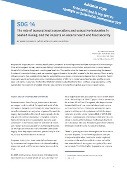
The role of transnational corporations and extractive industries in seabed mining, and the impacts on oceans health and food security
As in 2016, the Reflection Group on the 2030 Agenda for Sustainable Development will launch its "Spotlight on Sustainable Development 2017" during this years High-Level Political Forum on Sustainable Development in July in New York. As an advance exceprt, the Group publishes the chapter on SDG 14 by Maureen Penjueli (Pacific Network on Globalization) on occasion of the Ocean Conference (June 5-9, 2017 at UNHQ, New York).
Intro: Despite the importance of a healthy Pacific Ocean, evidence is mounting that this unique ecosystem is in real danger from anthropogenic threats such as overfishing, habitat destruction, and pollution and probably the most severe threat of all, climate change and resulting sea level rise. The rush to mine the deep seas is representing the newest frontier of extractive industry and perhaps the biggest threat to the world’s oceans in the 21st century. There is a significant concern that seabed mining has the potential to cause major environmental destruction to the entire Pacific Ocean and would seriously undermine the implementation of SDG 14, to conserve and sustainably use the oceans, seas and marine resources. The fact that the International Seabed Authority does not have an agreed policy on the sustainable management of seabed minerals yet, points to the significant global gap in oceans governance.
